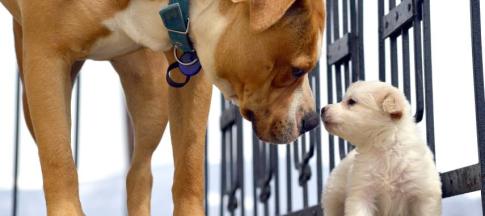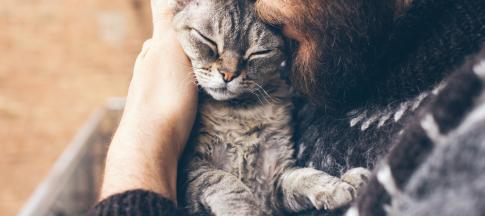
While your adult cat might have continued to behave like a kitten at times, there will eventually come a day when they start to slow down.
It’s an inevitable part of the ageing process, but there's lots you can do to help your furry friend be happy and healthy in their twilight years.
Signs your cat is ageing
A cat’s average life expectancy is 12-14 years, but it’s not uncommon for them to live to 20.
Cats are generally classed as senior at 11 years old, and it’s around this time that you may start noticing some changes in your pet, like:
- a decrease in their activity levels
- less time spent outdoors hunting
- change of appetite
- their vision or hearing getting worse
- a change in their toilet habits
- sleeping more but less deeply
- the condition of their coat becoming worse
- age-related illnesses such as arthritis, diabetes or hyperthyroidism
- behaviour changes like becoming aggressive or seeming confused
When should I contact my vet?
Any changes in your cat’s behaviour and appearance could be an early indicator of illness, so it’s important you speak to your vet about if you have any worries about their eating, drinking or toilet habits.
If you notice any of the following, make an appointment with your vet as soon as possible:
- they've started eating less or drinking more
- smelly breath
- weight loss
- if they're limping
- any lumps or bumps
- trouble going to the toilet
- becoming disorientated or losing balance
Taking your senior cat for regular check-ups with your vet is a good idea anyway, so you can identify and treat symptoms early.
Some vet surgeries also run special geriatric clinics where owners can take their pets for advice and support.
Feeding your senior cat
As cats age, their dietary and nutritional needs change. They’ll likely burn fewer calories than when they were younger.
Consider switching your cat to a 'senior' food as it’ll be specially formulated to their life stage. As with any changes in diet, you should transition gradually over a week to avoid upset stomachs.
Some senior cats may need a bit of encouragement to eat if their senses have gotten worse and the experience isn't as exciting as it once was.
If your oldie is reluctant to eat, you could try:
- feeding them smaller meals more frequently so they aren’t overwhelmed by a large bowl of food
- warming up their food to increase its appeal
- if your dog has any dental issues, they may prefer softer food to crunchy kibble
- putting their food in a puzzle feeder to make mealtimes more fun as well as improve mental stimulation
- if they suffer from achy and stiff joints, try raising their bowl slightly to make it more comfortable for them
- encourage drinking by putting multiple water bowls around your home or consider buying a cat drinking fountain for continuous fresh water
Grooming your senior cat
Grooming becomes more difficult for cats as they age. Stiff and aching joints can make it hard for them to get to those hard-to-reach places.
Help them with regular gentle brushing, which also allows you to check them for any lumps and bumps your vet can look into.
Long-haired cats may also need their coat trimmed around their rear end to keep the area clean and free from matting.
Making your home suitable for your older cat
As they age, your senior cat may benefit from changes around the house to make their lives more comfortable.
Remember that older cats can be more sensitive to disruption, so make any changes gradually.
Stairs
If you live in a multi-storey home, consider keeping their essential items on one floor.
Your cat may also benefit from rugs being laid on any non-carpeted floors to stop them from slipping.
Add ramps or steps up to their favourite perch so they don’t need to jump, which could be uncomfortable for them or cause injury.
Litter tray
If your senior cat is less steady on their feet, they may benefit from a change of litter tray for one that's lower and has easy access. Also, make sure it has some wiggle room.
Older cats may find some types of litter rough on the paws, so test a softer one to see if they prefer it.
Scratching posts
If your cat likes to use a scratching post to sharpen their claws, they might find a horizontal scratching surface easier if their joints start getting stiff.
Insuring your older cat
Cat insurance helps cover treatment costs if your older cat gets sick. Find out more about our cat insurance here.
I’ve spent 20 years writing about pets and exploring the wonderful relationships they have with their owners. I started as a staff writer on Dogs Today magazine, working my way up to become deputy editor in 2008. In 2010, I left the office to pursue a freelance career, relocated to north Norfolk and started a family.
Over the years I’ve contributed thoughtful human-interest features, celebrity interviews and investigative news stories to publications including The Sunday Times, Dogs Today, Dogs Monthly and Your Cat. I’ve also ghost-written veterinary books and press releases for the pet industry.
When I’m not writing, I enjoy long walks in the Norfolk countryside with my rescue lurcher Popsie. These are always followed by tea and cake.




